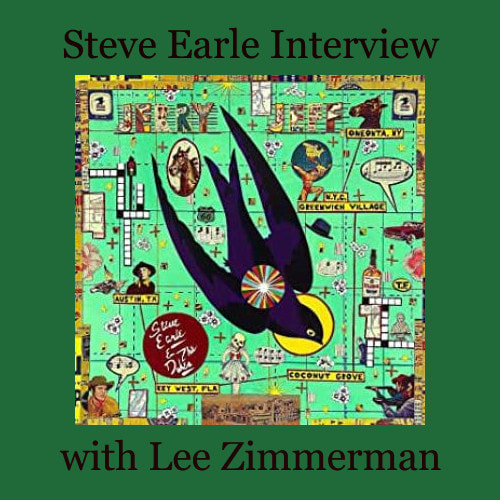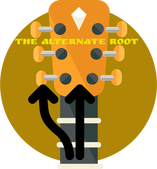|
The Breadcrumbs Widget will appear here on the live site.
6/17/2022 STEVE EARLE INTERVIEW WITH LEE ZIMMERMAN
STEVE EARLE INTERVIEW WITH LEE ZIMMERMAN
Steve Earle’s Latest Effort, Jerry Jeff, Finds Him Offering Up Yet Another Homage to One of His Heroes (by Lee Zimmerman) Steve Earle may be known as a renegade first and foremost, but if that’s the case, then he’s a reverent renegade as well. He began recording a series of albums in tribute to his mentors and friends, Townes Van Zandt and Guy Clark specifically, with the aptly named Townes in 2009 and Guy, some ten years later. With his new album, Jerry Jeff, he completes a trilogy of sorts as he pays tribute to Jerry Jeff Walker, a singer/songwriter who was considered one of the pioneers of the genre that came to be called ‘Outlaw Country’, a style that helped contribute to the rise in what’s now known today as Americana. Of course, it’s not that Earle has ever lacked for material. With nearly 20 studio albums released over the course of his 35 year career, a seamless transition in styles that’s incorporated Country, Bluegrass, Roots, Rock, and Folk, and, most importantly, a lengthy list of classics of his own composition — “Guitar Town”, “I Ain’t Ever Satisfied”, “Copperhead Road”, “The Revolution Starts Now”, and “Transcendental Blues” among them — he’s become one of the most important artists of the era. So too, his awards and accolades (Three Grammys and induction into the Nashville Songwriters Hall of Fame, included) offer a testament to his accomplishments. The Alternate Root recently had a chance to sit down with Mr. Earle, who, despite his rowdy reputation, turned out to be quite accommodating. We began by talking about the new album, but in the process, he eagerly opened up about his backstory as well. Lee Zimmerman (LZ): Let’s discuss your new wonderful new album, Jerry Jeff. In the case of Guy and Townes, it was clear that the two men you namechecked in the album titles were very good friends of yours. Was that the case with Jerry Jeff Walker as well? Steve Earle (SE): Let’s just say I would have never have known those two without Jerry Jeff. I knew about Jerry Jeff long before I knew about any of them. He was one of the heroes of mine, like John Sebastian, or John Lennon, or Bob Dylan, or Johnny Cash, and because I knew him from the records. One of my drama teachers in high school gave me a copy of “Mr. Bojangles” because he wanted me to do “Mr. Bojangles” in a play that we did. I was in ninth grade at the time, and so I knew about Jerry Jeff long before the other guys. When I got out on my own, which is when I was not quite 17, I hitchhiked all over Texas, but I could only play coffee houses because I wasn't old enough to be in places that served liquor. LZ: So being in Texas obviously brought you closer to Jerry Jeff’s environs… SE: Word had it he did not like to pay for transportation. He did not like to pay for hotel rooms when he was touring in those days. I think that's why the duo with him and David Bromberg didn't last forever. Bromberg wanted to fly and take trains and stay in hotels. Jerry Jeff didn't like to pay for all that. He said he was a couch surfer, albeit a pretty famous one. He and Townes and Guy knew each other going way back. I learned about Guy Clark from Jerry. By that time, Jerry had just settled in Texas. I watched that happen because they were already writing songs for the Lost Gonzo band. I also remember hearing “Geronimo’s Cadillac” by Michael Murphy Murphy before that. That was a seminal record for me. LZ: Is it safe to say that those early Texas singer/songwriters had a big effect on you? SE: There were three or four things that happened that made me feel alright about having long hair and cowboy boots. It was part of what came to be called progressive Country. I had taken a construction job, and I worked it for two weeks. I got the word that Jerry Jeff was gonna play this place called Castle Creek on his birthday, and so I quit the job, which meant I left one paycheck behind. So, I hitchhiked to Austin and went to see Jerry Jeff at Castle Creek. I overheard someone in the band telling a girl where the party was, and I lied to this other girl I'd met and said that we were invited. So, we went and I kept my cowboy hat down over my eyes. And Jerry Jeff was there and all these other great people were there too. Rusty Wier was there. Steve Fromholz was there and then Townes arrived. When Townes came through the door, I knew who he was, but I'd never met him. He had on this beautiful buckskin jacket that Jerry Jeff had given him off of his back, because their birthdays are about eight or nine days apart. And he had this beautiful girl on his arm and he was wearing this beautiful buckskin jacket. He started a dice game and he lost every dime he had, and the jacket. At that point, it became more about Townes for me than Jerry Jeff, so I ended up following Townes to Houston once I found out where he was headed. So ultimately, they were all connected for me. LZ: So, when did you actually have a chance to get acquainted with Jerry Jeff? SE: Once I moved to Nashville, I finally got to meet Jerry Jeff and get to know him. He gave me my first introduction to Guy. When Jeff would come to town, I would be his designated driver because he was afraid to drive. LZ: This album is really such a treasure because it’s likely that the majority of the masses know the song “Mr. Bojangles” but don't really know much about the other songs Jerry Jeff wrote or even have an idea, of who Jerry Jeff was and what he did. So, it’s clear that you're really doing a service and bringing this music to the masses. SE: For me, it was all about the songs that he wrote. He was also a champion of other people's songs. That’s how I got to know about Guy. LZ: Given the fact that you’ve done this trifecta of albums by Townes, Guy, and Jerry Jeff, do you find you’re balancing on a fine line between retaining the signature sound of the original songs and putting your own spin on it so that it becomes a different entity? SE: I don’t think about that anymore. The band that I have now is the best band I've ever had. This band can play any of the things that I've written over the years, they can do the Bluegrass stuff, they can do the Rock and Roll stuff, we can do anything. And so, we have a sound. That said, this Jerry Jeff record is a little different than the other ones. There's not a song on this record that I didn't play at one point. I used to play “Mr. Bojangles” — I played that in the seventh-grade talent show. I had this very deep relationship with these songs. LZ: It’s very impressive how you take certain songs and make them so personal. One song that comes immediately to mind is “My Old Man”. It's such a poignant song. And the way you do it makes it seems like it was written from your point of view. SE: I used to sing that song every night. There’s a later version of it that's shorter and the lyrics are slightly different. That's on Jerry Jeff Walker’s first MCA record, but the original version is on one of the Vanguard records. Buffett said he was gonna steal the song from me, but it's all made up, because I know a little bit about his family background. That's not how he grew up, but it also sounds very real, so there's something that he heard from somebody. LZ: The song “I Makes Money (Money Don't Make Me)” could be a signature song of yours. SE: He got it from a street singer in New Orleans who made a few recordings. He was like just a street performer and he knew every song in the world, and he was just a great busker. And he was a big influence on Jerry Jeff. Jerry Jeff used to hang out with him in New Orleans and he probably influenced the persona of “Mr. Bojangles”. Although there's no way he could meet somebody in jail there. And I think he did. He says he did it, but there’s no way because that person was African American and the jail was segregated. In the early 60s, black people and white people didn't see each other in jail. Orleans Parish prison is the county jail if you get thrown behind bars in New Orleans. LZ: In my opinion, “Mr. Bojangles” is one of the saddest songs ever written, especially that part where he says, ‘The dog up and died’. I'm a dog lover, so that gets me every time.” SE: It gets to most people. I don't really want to hang out with the people that it doesn’t get to. LZ: Plus, you really sing it from the heart. SE: I've been singing it for so long. And the only difference in coming back to it is that I didn't sing it for years. I think I inhabit it more than I used to just because of the little bit of acting that I started doing. So, I think I do that I do it differently now, and I hope a little bit better, because I’m just trying to put myself inside the character and into the song a little bit more. I'm very, very proud of this version of “Mr. Bojangles”. LZ: Well again, it sounds very emotional, and almost tattered in a way. It just really feels like it's coming from the heart. SE: Most people know the Dirt Band version. Jeff Hanna of the Dirt Band called me and said when he heard my version of it, he wanted to congratulate me on it. It's a little different, but it’s still a nod to the Dirt Band arrangement in the sense that it's a full band arrangement. I thought about doing it solo, but we recorded it as a waltz, and as a result, my drummer is playing it like a waltz. Waltzes were so much a part of Country music in Texas at one time. It was important to me, and I'm just glad we pulled off that version of it. Listen and buy the music of Steve Earle & The Dukes from AMAZON For more information and purchase options, please visit the Steve Earle & The Dukes website The Blog Tags widget will appear here on the published site.
Tags:
0 Comments
The Recommended Posts widget will appear here on the published site.
Leave a Reply. |
- Home
- Top Ten
- It's All Music Radio
- Latest Videos
- All Reviews
- Breaking Thru
- Who's Playing Near Me?
- Seen & Heard
- About
- Contact
The Category Navigation Widget will appear here on the live site.
|
To submit music, please mail a copy of your CD to the following address:
Danny McCloskey The Alternate Root 1717 East Vista Chino Ste A7 PMB 302 Palm Springs, CA 92262 |
Contact Us |
©2021 The Alternate Root All Rights Reserved
website by Jim Cortez [email protected]
website by Jim Cortez [email protected]


